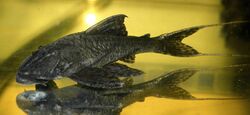Biology:Peckoltia pankimpuju
| Peckoltia pankimpuju | |
|---|---|

| |
| The shallow-water form of the species. | |
| Scientific classification | |
| Domain: | Eukaryota |
| Kingdom: | Animalia |
| Phylum: | Chordata |
| Class: | Actinopterygii |
| Order: | Siluriformes |
| Family: | Loricariidae |
| Subfamily: | Hypostominae |
| Tribe: | Ancistrini |
| Genus: | Peckoltia |
| Species: | P. pankimpuju
|
| Binomial name | |
| Peckoltia pankimpuju Lujan & Chamon, 2008
| |
| Synonyms | |
|
Hemiancistrus pankimpuju Lujan & Chamon, 2008 [1] | |
Peckoltia pankimpuju is a species of armored catfish from the family Loricariidae, native to the Marañón River in the upper Amazon basin of Peru.[2] It is commonly called the coal pleco, Peruvian lyre-tail, and L350 under the L-number code.[3][4][5][6] It reaches up to about 40 cm (16 in) in length.[6]
This species, Panaque bathyphilus, Panaqolus nix, Loricaria spinulifera and L. pumila are the only loricariid catfish species known to occur in a deep water form with reduced pigment and eyes (similar to cavefish), and another "normal" form in shallower waters.[2][6][7][8] P. pankimpuju and a few other loricariid catfish species of the main stream of large South American rivers have greatly elongated streamers on their tail.[2] It is speculated that this may serve as an early warning system against the large predatory catfish that also roam their habitat. Positioned with the head towards the water current, as typical of loricariid catfish, the long tail streamers of P. pankimpuju are the first to be contacted by a large predator that hunts against the current, perhaps allowing it to escape.[2]
References
- ↑ Armbruster, J.W.; Werneke, D.C.; Tan, M. (2015). "Three new species of saddled loricariid catfishes, and a review of Hemiancistrus, Peckoltia, and allied genera (Siluriformes)". ZooKeys (480): 97–123. doi:10.3897/zookeys.480.6540. PMID 25685026. PMC 4319111. https://zookeys.pensoft.net/articles.php?id=4632.
- ↑ 2.0 2.1 2.2 2.3 Lujan, N.K.; Chamon, C.C. (2008). "Two new species of Loricariidae (Teleostei: Silurifomes) from main channels of the upper and middle Amazon Basin, with discussion of deep water specialization in loricariids". Ichthyological Exploration of Freshwaters 19 (3): 271–282. http://aquaticecology.tamu.edu/files/2014/07/Lujan-2008b.pdf.
- ↑ Seidel, I. (2008). Back to Nature - Guide to L-Catfishes. p. 201. ISBN 978-91-89258-11-2. http://backtonature.nu/l-catfishes.php.
- ↑ Werner, A. (2003). "Armoured catfish from Brazil and Peru". DATZ. http://www.datz.de/images/stories/artikel-l-nummern/L%20345%20bis%20L%20350%20-%20Harnischwelse%20aus%20Brasilien%20und%20Peru%202003-12.pdf.
- ↑ Schraml, E.; Schäfer, F. (2004). Loricariidae: all L-numbers. Germany: Aqualog. pp. 24, 84, 220. ISBN 3-936027-51-X. http://www.aqualog.de/product/aqualog-english/reference-books/?L=1. Retrieved 2015-04-10.
- ↑ 6.0 6.1 6.2 "Peckoltia pankimpuju". PlanetCatfish. https://www.planetcatfish.com/common/species.php?species_id=756. Retrieved 5 May 2017.
- ↑ Cramer, C.A.; L.H.R. Py-Daniel (2015). "A new species of Panaqolus (Siluriformes: Loricariidae) from the rio Madeira basin with remarkable intraspecific color variation". Neotrop. Ichthyol. 13 (3): 461–470. doi:10.1590/1982-0224-20140099.
- ↑ Thomas, M.R.; L.H.R. Py-Daniel (2008). "Three new species of the armored catfish genus Loricaria (Siluriformes: Loricariidae) from river channels of the Amazon basin". Neotrop. Ichthyol. 6 (3): 379–394. doi:10.1590/S1679-62252008000300011.
Wikidata ☰ Q9002569 entry
 |

